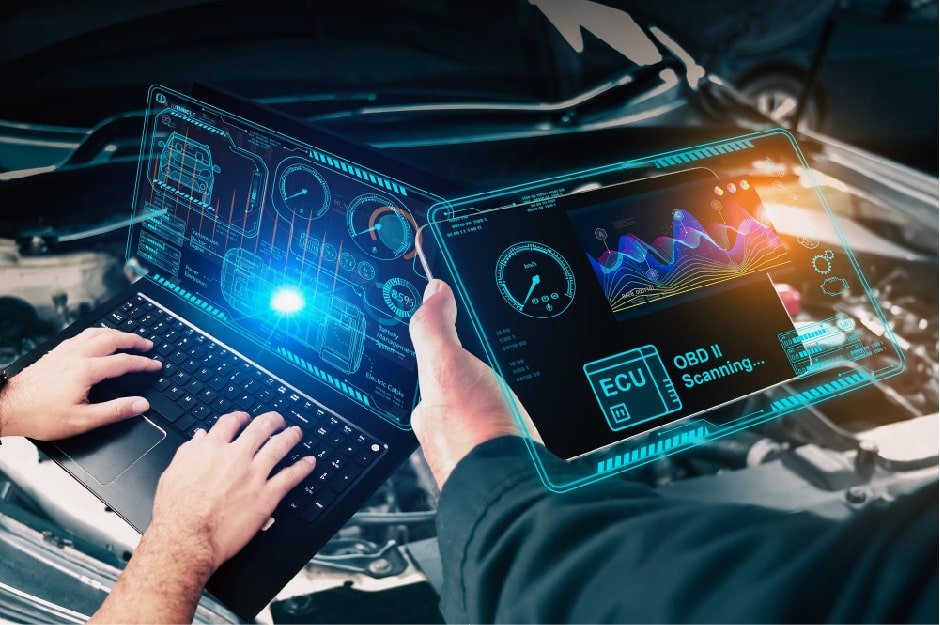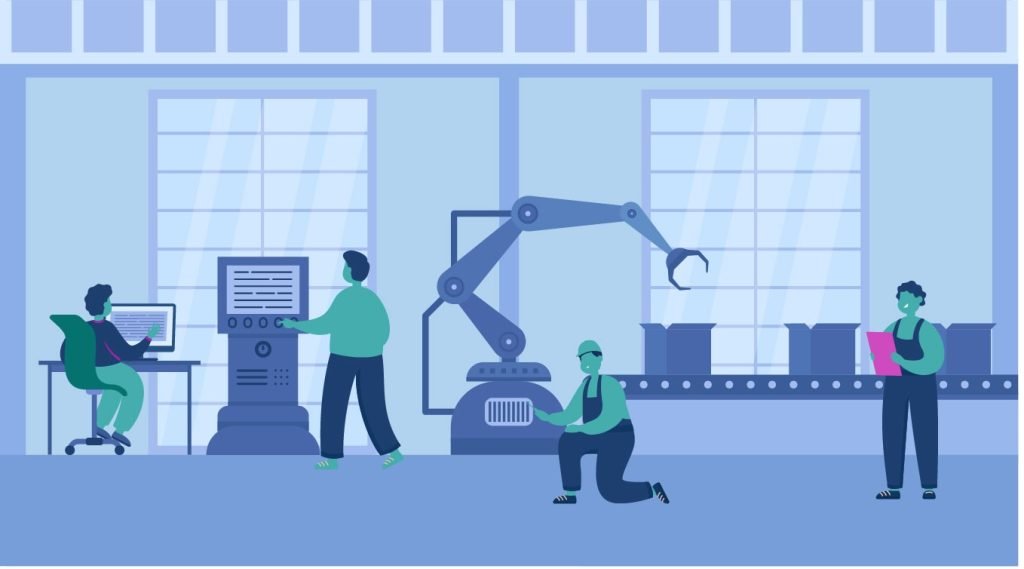Bajaj Auto, a prominent player in the Indian automotive sector, boasts a rich history dating back to its inception in 1945. Founded by Jamnalal Bajaj, the company initially started as a trading entity and later evolved into a manufacturer of two-wheelers and three-wheelers. Over the decades, Bajaj Auto has carved a niche for itself, becoming a symbol of innovation, reliability, and affordability in the automotive market.

In the context of the automotive industry, the sector has witnessed dynamic changes, with rapid technological advancements and shifting consumer preferences. The advent of electric vehicles, connectivity features, and changing market dynamics necessitates an agile response from automotive manufacturers to stay competitive.
Recognizing this, Bajaj Auto has strategically embraced digitization as a means to enhance operational efficiency, engage with tech-savvy consumers, and position itself as a forward-looking player in the ever-evolving automotive landscape. The rationale for digitization is rooted in staying ahead of industry trends, fostering innovation, and delivering an unparalleled customer experience.
Objectives of Digitization

The objectives of digitization at Bajaj Auto encompass enhancing operational efficiency, elevating customer experiences, and facilitating data-driven decision-making to secure a competitive edge in the dynamic automotive industry.
Streamlining Operations
Digitization at Bajaj Auto aims to streamline internal processes, optimizing efficiency and reducing manual intervention. Through the integration of advanced technologies, the company seeks to enhance production workflows, minimize bottlenecks, and achieve a more agile and responsive operational framework.
Enhancing Customer Experience
With a customer-centric approach, Bajaj Auto’s digitization endeavors focus on elevating the overall customer experience. Utilizing digital platforms and personalized engagement strategies, the company aims to create seamless interactions, from online sales experiences to post-purchase services, fostering stronger connections with its customer base.
Improving Decision-Making
Digitization plays a pivotal role in providing real-time data and analytics to support informed decision-making. Bajaj Auto seeks to leverage data-driven insights across various business functions, enabling agile responses to market trends, demand fluctuations, and operational challenges, thereby enhancing the precision and effectiveness of strategic decisions.
Increasing Market Competitiveness
Bajaj Auto’s digitization objectives extend to gaining a competitive edge in the automotive market. By embracing digital innovations, the company aims to position itself as an industry leader, offering cutting-edge products and services that not only meet but exceed customer expectations, thus strengthening its market presence and competitiveness.
Digitization Initiatives

Bajaj Auto’s digitization initiatives span across digital manufacturing processes, integrating Industry 4.0 technologies and automation in production, to advanced customer-centric strategies such as online platforms, personalized marketing, and CRM systems, all aimed at fostering operational excellence, customer engagement, and market competitiveness.
Digital Manufacturing Processes

Implementation of Industry 4.0 technologies: Bajaj Auto is at the forefront of digital manufacturing, incorporating Industry 4.0 technologies such as IoT, AI, and machine learning. This ensures a connected, intelligent, and automated production environment, fostering efficiency, reducing downtime, and enabling predictive maintenance.
Automation in production and supply chain: The company has strategically embraced automation in its production and supply chain processes. Automated systems enhance precision, speed up manufacturing cycles, and optimize logistics, resulting in a more responsive and cost-effective end-to-end production ecosystem.
Digital Marketing and Sales

Online platforms and e-commerce integration: Bajaj Auto has expanded its digital footprint by integrating online platforms and e-commerce channels. This allows customers to explore, customize, and purchase vehicles seamlessly, fostering a convenient and accessible buying experience.
Digital advertising and customer engagement strategies: Leveraging digital advertising and engagement strategies, Bajaj Auto engages with its audience across various online channels. This not only enhances brand visibility but also facilitates interactive communication, creating a more personalized and dynamic connection with potential buyers.
Customer Relationship Management (CRM) Systems

Implementation of CRM software: Bajaj Auto has implemented advanced CRM systems to streamline customer interactions. These systems facilitate efficient communication, order tracking, and issue resolution, enhancing overall customer satisfaction and loyalty.
Personalization and data-driven customer interactions: By harnessing customer data, Bajaj Auto tailors its interactions, providing personalized experiences. This data-driven approach ensures that customers receive relevant information, offers, and support, fostering stronger relationships and brand affinity.
Internet of Things (IoT) Integration
IoT in vehicles for data collection: Bajaj Auto integrates IoT into its vehicles for comprehensive data collection. This enables the company to gather insights into vehicle performance, usage patterns, and user behavior, contributing to continuous product improvement and innovation.
Predictive maintenance and real-time monitoring: Through IoT, Bajaj Auto implements predictive maintenance practices and real-time monitoring of vehicle health. This not only enhances the reliability of its products but also enables proactive maintenance, reducing downtime for customers.
Data Analytics and Business Intelligence

Utilizing data for strategic decision-making: Bajaj Auto employs robust data analytics to make informed strategic decisions. By analyzing data from various sources, the company gains insights into market trends, customer preferences, and operational efficiency, guiding its decision-making processes.
Market analysis and trend forecasting: Data analytics at Bajaj Auto goes beyond operations; it extends to market analysis and trend forecasting. This proactive approach allows the company to anticipate shifts in consumer preferences and market dynamics, positioning itself ahead of the competition.
Challenges and Solutions
Digitization at Bajaj Auto faces challenges in terms of overcoming employee resistance and ensuring seamless integration with legacy systems. Additionally, cybersecurity concerns demand a proactive approach, necessitating the implementation of robust measures and regular security audits to safeguard digital assets and customer data.
Employee Training and Resistance

Training programs for staff: To overcome resistance to digitization, Bajaj Auto invests in comprehensive training programs. These initiatives ensure that employees acquire the necessary skills to operate new technologies, fostering a culture of continuous learning and adaptation.
Change management strategies: Recognizing the importance of change management, Bajaj Auto employs strategies to ease the transition. Clear communication, involvement of employees in decision-making, and highlighting the benefits of digitization contribute to overcoming resistance and ensuring a smooth implementation.
Cybersecurity Concerns

Implementation of robust cybersecurity measures: Bajaj Auto places a high priority on cybersecurity by implementing robust measures. This includes advanced encryption, secure network configurations, and the adoption of industry best practices to safeguard digital assets and customer data.
Regular security audits and updates: To stay ahead of emerging threats, Bajaj Auto conducts regular cybersecurity audits and updates. This proactive approach ensures that security protocols are current, and any vulnerabilities are promptly identified and addressed, maintaining the integrity of the digital infrastructure.
Integration with Legacy Systems
Gradual phase-out of legacy systems: Bajaj Auto addresses the challenge of integrating with legacy systems by adopting a phased approach to their retirement. Gradual phase-out allows for a smoother transition, minimizing disruptions to ongoing operations while introducing new technologies.
Seamless integration strategies: Employing seamless integration strategies, Bajaj Auto ensures that new digital systems seamlessly interface with existing ones. Compatibility measures, middleware solutions, and careful planning contribute to a cohesive and integrated digital ecosystem.
Benefits Realization
Improved Efficiency and Productivity

The digitization initiatives at Bajaj Auto translate into improved operational efficiency and increased productivity. Automation in manufacturing processes, streamlined operations, and data-driven decision-making contribute to a more agile and responsive organization.
Enhanced Customer Satisfaction
Digital marketing, personalized customer interactions, and online platforms enhance the overall customer experience. Bajaj Auto’s commitment to digitization results in improved service delivery, quick response times, and a customer-centric approach, ultimately boosting customer satisfaction.
Competitive Advantage in the Market
Bajaj Auto’s proactive approach to digitization positions the company as an industry leader. By staying ahead of technological trends and meeting evolving customer expectations, the company gains a competitive edge, setting itself apart in the dynamic automotive market.
Financial Impact and ROI
The digitization initiatives at Bajaj Auto contribute to a positive financial impact. Increased efficiency, customer satisfaction, and market competitiveness result in a favorable return on investment (ROI). The strategic implementation of digital technologies aligns with long-term financial sustainability and growth.
Conclusion
Bajaj Auto’s forward-thinking approach to digitization not only enhances its internal processes but also redefines the customer experience, reinforcing its position as a dynamic and customer-focused player in the automotive industry. As the company continues to explore emerging technologies and market trends, the digitization journey remains a crucial element in shaping Bajaj Auto’s future trajectory.
Visit our website to delve into ERP solutions tailored for your organization. Uncover a comprehensive overview of how our services can support you in effective management solutions and beyond.
All images belong to their respective owners. Please email [email protected] if removal is required.




